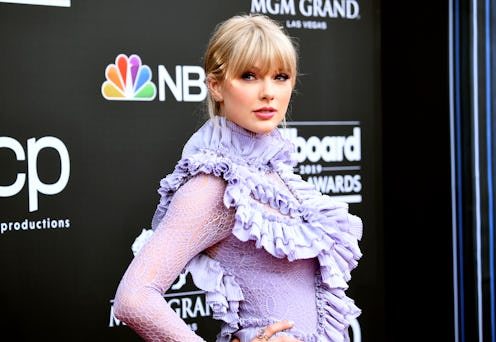Entertainment
Taylor Swift May Have Changed The Music Industry — Again

Taylor Swift has seen her share of controversy during her years in the spotlight, and she has often let fans in on the details. But on June 30, when Swift publicly called out music producer Scooter Braun after he bought her music catalogue from Big Machine Records, she wasn't just standing up for herself — she was putting in motion a power shift that could impact the entire music industry. In a business where speaking up can put your career at significant risk, Swift’s comments felt groundbreaking.
"Some fun facts about today’s news: I learned about Scooter Braun’s purchase of my masters as it was announced to the world," Swift wrote in a Tumblr post. "All I could think about was the incessant, manipulative bullying I’ve received at his hands for years."
This type of sale isn't unusual; artists rarely own their "masters," or original recordings, but let labels take ownership in exchange for the profitability that comes with promoting and licensing their work. Swift claimed that for years she had "pleaded" with Big Machine Records to let her own her work outright, calling the company's deal with Braun her "worst case scenario." The post was lengthy, specific, and unapologetic — and considering Swift no doubt anticipated the immediate stir it would cause, it was also a big risk.
The entire saga has shed light on an ongoing issue in the music industry: Too often performers feel like they can't speak out about the management of their work.
Her comments went viral almost immediately, eliciting reactions from fans, artists, and industry players alike. Braun did not respond directly to Swift's statement, although it did prompt other public figures to defend him — most prominently, Justin Bieber, who said in an Instagram post that Swift wasn't "fair" to Braun, as well as Scott Borchetta, Big Machine's founder and CEO, who posted a public letter defending his decision to make the sale. While ultimately these comments won't upend the career of someone as well established in the music industry as Swift, these reactions from powerful people demonstrate the risk that performers take in asserting themselves and vying for the rights to their own work.
Since then, Swift used the launch of her new album Lover to publicly announce her intention to rerecord her masters, sharing on Good Morning America on Aug. 22 that she will start the process in November 2020, when her contract legally allows it. While rerecording could serve as a partial remedy to Swift's situation — if fans opt to listen to her new versions of the tracks rather than the old ones — the entire saga has shed light on an ongoing issue in the music industry: Too often performers feel like they can't speak out about the management of their work. Particularly for performers navigating an industry dominated by men — who often control the financial backing and industry connections they need to make or break a platform — it is difficult to speak out without fear of lost opportunities, a resulting financial hit, or damage to their professional reputations. It's no secret that performance industries are fraught with power struggles, but because of everything performers have at stake, they often go unaddressed.
By speaking out, Swift also created a powerful precedent of a performer publicly revealing the specifics of that financial imbalance, essentially putting record labels on notice.
Swift's ability to speak out on this issue undeniably hinges on the fact that she is one of the highest paid, most recognizable performers in the world, in addition to coming from considerable privilege. A post like this wouldn't affect her and her career the way it might impact an artist with less clout, but it did have a potential effect on Swift's reputation, as she knew it would again place her at the forefront of a public conflict. She likely also understood that calling out Braun wouldn't stop the sale or allow her to regain control of her old music. But she did it anyway, and in the process revealed to many unaware consumers how much control artists are forced to give up to have careers in the first place.
By speaking out, Swift also created a powerful precedent of a performer publicly revealing the specifics of that financial imbalance, essentially putting record labels on notice. As a result, musicians earlier in their careers might begin to question the deals they are pressured into — after all, Taylor Swift did. And if the rerecording of her masters ends up delivering a financial hit to her previous label, it could force labels to reconsider the long-term fairness of the deals they're offering.
This isn't the first time Swift has questioned the industry's financial structure, often to the benefit of other performers. In 2014, she pulled her music from Spotify out of concerns for the platform underpaying artists, returning in 2017, months after Spotify made a move that gave artists more control over the accessibility of their new releases on the platform. She called out Apple Music for not paying artists for streams made to users in a three-month free trial offer in 2015. Her impact with Apple was immediate — the company reversed the policy, agreeing to pay artists for the trial streams the next day.
The impact of Swift's statements about Scooter Braun and the decision to rerecord her original tracks may not be as immediate or clean cut, but they will no doubt be as lasting for the industry. If change is going to happen, it has to start with those who have the loudest mics.
This article was originally published on